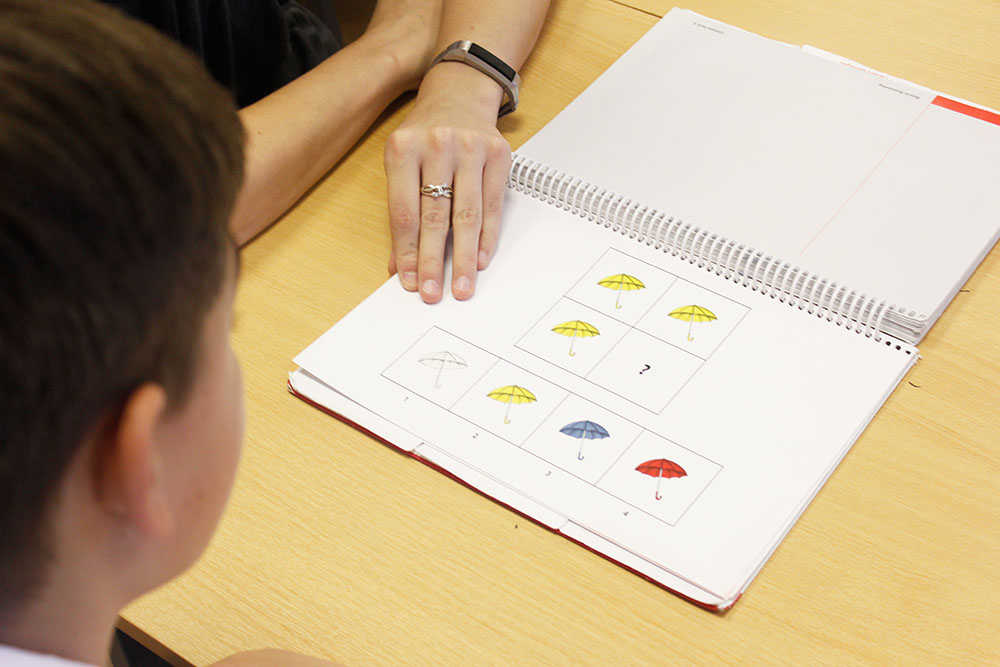

Developmental Dyscalculia (DD) is a specific learning disorder that is characterised by impairments in learning basic arithmetic facts, processing numerical magnitude and performing accurate and fluent calculations. These difficulties must be quantifiably below what is expected for an individual’s chronological age, and must not be caused by poor educational or daily activities or by intellectual impairments.
There are a number of indicators which may suggest that an individual has Dyscalculia, including:
The effects of Dyscalculia on a child or young person can impact many other areas of learning and can lead to low self-esteem.

A boy completing a cognitive assessment as part of a dyscalculia assessment
A Dyscalculia screening is available prior to a full Dyscalculia assessment and these are short assessments related to mathematical knowledge and memory. A screener can be used to decide whether a full assessment is necessary.
Before a Dyscalculia diagnosis can be made, a number of evidence-based numeracy intervention cycles should have happened within the education setting. These cycles will indicate whether there has been any progress following a targeted intervention.
Prior to a comprehensive Dyscalculia assessment it is possible to have a short screening to determine if an assessment is necessary, as the mathematical difficulties could have a separate cause. Interventions and strategies need to have been implemented for a period of time before a diagnosis of Dyscalculia can be made.
A screening will include testing mathematical skills and numerical operations.
There is no individual assessment for Dyscalculia so our specialist educational and child psychologists will carry out a range of assessments to reach a conclusion.
A cognitive assessment will be used to look at mathematical skills, memory and other aspects related to learning. Cognitive assessments provide a standardised result which allows our specialists to explore the cognitive abilities and understand how the child or young person is doing in relation to what is expected for their age.
An academic attainment assessment will also be used to gain an overview of academic abilities which will create a profile of strengths and difficulties.
Observing children and young people within the classroom supports a holistic assessment through naturally occurring situations.
A discussion with a teacher, other member of education staff, a parent or carer allows us to gain a full understanding of the child or young person’s strengths and difficulties. Our educational and child psychologists will have a conversation with the child or young person about the difficulties they are having within mathematics and if they find other school subjects challenging. During this discussion our psychologist will learn about prior evidence-based interventions which have already taken place and the results following the interventions.
The combination of assessments, an observation and a discussion will highlight areas of strengths and need which will be used to form a decision relating to Dyscalculia. This information will be incorporated into the final decision.
The specific assessments used will be chosen based on the child or young person. The main assessments we use are:
There are other assessments which may be used during a Dyscalculia assessment, if these are predicted beforehand then they will be mentioned during the Initial Discussion.
After a Dyscalculia assessment we will explain our findings and whether the difficulties the child or young person is experiencing appear to be specific. A report will be written following this explanation.
If the child or young person has mathematical difficulties which are not Dyscalculia then our specialist psychologists can make appropriate recommendations for support, which should be read by both home and education settings for a consistent approach.
If Dyscalculia has been confirmed then a formal diagnosis would follow after consulting with school about any interventions or support in place at school. If interventions and strategies are not yet in place then we would make recommendations and review after an agreed amount of time. The educational and child psychologist can work with the education setting to set targets specific to the child or young person. A post-test following an intervention would be necessary to confirm Dyscalculia.
Interventions for Dyscalculia come with many benefits as they help to narrow the gap caused by challenges faced. Through identifying any gaps, interventions will be able to build a solid foundation for further numeracy development. If Dyscalculia has been confirmed then targeted interventions help children and young people to use their strengths alongside additional strategies. Evidence-based interventions and strategies can lead to the improvement of numerical skills, including number meaning, perceptual and reasoning skills.
Our psychologists support a broad range of evidence-based Dyscalculia interventions and can design a bespoke intervention if required. If there is a specific intervention which you would like us to support then please contact us now to see how we can help.
We offer additional psychological services related to Dyscalculia in addition to screenings, assessments and interventions. Some of the additional services we provide include:
The services mentioned above can be used alongside an assessment or intervention or in isolation. If you require a service which is not mentioned above then please contact us to see how our team can help.
Dyscalculia is a specific learning difficulty primarily centred around mathematical skills and understanding, although it can affect other subject areas. Children and young people with Dyscalculia can use specialist strategies and receive support to help them to be happy, safe and ready for life’s challenges. To book a Dyscalculia assessment or to find out more, please contact us.








Once again thank you for all your help and for actually listening to me when others wouldn’t.

Jodie (Parent)
Thank you Julie once again for the excellent report, it captured the child’s needs entirely - SENDIASS, parents and me commented on how well written it was. Many thanks for your continued assistance.

SENCO
Sarah Ward was brilliant with us. Really happy with the help and support, would recommend.

Joanne (Parent)
I think the work you have been doing has been great to help break the stigma of mental health and as a fellow sufferer I know how important that is.

Mental health professional
Many thanks for Sarah W’s hard work with our students which has been very well received.

Deputy Head
Really enjoyed it and learnt lots that I can take back to school. Thank you for the quality experience.

Sarah Tindal
Thank you Julie once again for the excellent report, it captured the child’s needs entirely - SENDIASS, parents and me commented on how well written it was. Many thanks for your continued assistance.

SENCO

We provide bespoke solutions to suit all budgets and requirements for children and young people aged 0-25 in homes, education settings and the community. Our clinical, educational and child psychology services are cost effective.
To make a referral and arrange an initial discussion please complete our referral form.

Ready to get started? The next step is to speak to our team to find out more about the services we provide and how we can help. Call us on 0161 820 9229 or email office@hsrpsychology.co.uk